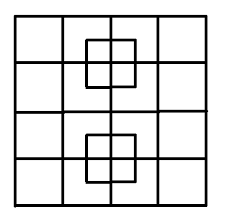How many squares can be found here?
First approach: Lets simply count...
Well, here we have a $4\times 4$ square and two patches of $2\times 2$ squares. It is not difficult to see that a $4\times 4$ square contains sixteen different $1\times 1$ squares, nine $2\times 2$ squares, four $3\times 3$ squares and one $4\times 4$ square. When we sum up all these squares we get 16+9+4+1=30. Notice that $1^2+2^2+3^2+4^2=30$, this may give us a clue on the general pattern of the problem... Teacher need to emphasize that in mathematics we always look for patterns. Now, the two $2\times 2$ squares, located in the middle of the $4\times4$ square, have 4+1=5 squares each (or $1^2+2^2=5$). Hence the number of all different "hidden" squares is equal to 30+5+5=40.

Second approach: Lets find a general formula
By counting the squares
we have seen that $1\times 1$ square contains 1 different square and
that $2\times 2$ square contains $1^2+2^2=5$ different squares and
that $3\times 3$ square contains $1^2+2^2+3^2=14$ different squares.
Similarly, we have seen by counting that a $4\times 4$ square contains
$1^2+2^2+3^2+4^2=30$ different squares. But what about $100\times 100$
square? How can we find the number of all different squares in
$100\times 100$ square?
To answer this question, lets consider a
$5\times 5$ square. If we take a $4\times 4$ square append the right
most column with a column of four $1\times 1$ squares and append the
last raw of the newly formed rectangle with a raw of five $1\times 1$
squares we get a $5\times 5$ square. Now, we already know that we can
find $\sum_{i=0}^4 i^2=30$ different squares in a $4\times 4$ square.
Lets find out how the additional appended column (without the appended
raw) contributes to the number of different squares. Clearly, the
appended column adds four $1\times 1$ squares. The appended column
also adds three $2\times 2$ squares, we can see this by starting from
the right top corner we start with a $2\times 2$ squares and count all
the squares by moving one grid down. Similarly we can count all the
additional $3\times 3$ squares formed by the appended column, this
give us two different $3\times 3$ squares. Finally, in a similar way,
we can count one $4\times 4$ square. Hence, the contribution of the
appended column to the total sum of squares is equal to $\sum_{i=1}^4
i$. Similarly, the contribution of the appended raw (raw of five
$1\times 1$ squares appended to the last raw of the rectangle) to the
total sum of squares is equal to $\sum_{i=1}^5 i$. Summing up these
two arithmetic sequences and adding them up yields \[ \frac{4\cdot
(4+1)}{2}+\frac{5\cdot(5+1)}{2}=\frac{5\cdot (4+6)}{2} = 5^2. \]
Hence, the total number of different squares that can be found in a
$5\times 5$ square is equal to \[ \sum_{i=1}^5 i^2 = \frac{5\cdot
(5+1)\cdot(2\cdot5+1)}{6} = 55. \]
Notice that the above argument can be applied to $n\times n$ square.
Hence, we can use induction to prove that the general formula for
computing the sum of all different squares. For any integer $m$, the
sum of all different squares that can be found in $m\times m$ square
is equal to \[ \sum_{i=1}^m i^2= \frac{m(m+1)(2m+1)}{6}. \] Armed with
this formula we can compute the number of all different squares
"hidden" in $100\times 100$ square. The sum of all different squares
in $100\times 100$ square is equal to $\frac{100\cdot 101\cdot
201}{6}=338350$.
What about a rectangle?
Suppose we have a rectangle that consists out of $n\times m$ grid squares, where $n\le m$. How many different square can we find in this triangle? The question is very similar to the case of of the square. We may cut this triangle to a square consisting $n\times n$ grid square and a rectangle that consists out of $n \times (m-n)$ square. If we repeatedly append ($m-n$ times) a column of $n$ grid square to the right most column of the $n\times n$ square, then we get our $n\times m$ rectangle. Now, as we saw before, each time we append a column we increase the number of different square by $\sum_{i=1}^n$. Hence the number of all different squares that can be found on the $n\times m$ rectangle is equal to \[ \sum_{i=1}^n i^2+(m-n)\sum_{i=1}^n i = \frac{n(n+1)(2n+1)}{6}+ \frac{(m-n)(n^2+n)}{2}. \]
Finding additional questions
In this part of the lesson we encourage student to derive additional problems. Student are asked to conjecture different properties or problem relate to this problem. This is the most important part in this lesson plan. No judgement are allowed, no proof or solution need to be provided. Instead, students should focus on questions. Later students may attempt to answer their questions, while continuing to derive new questions.